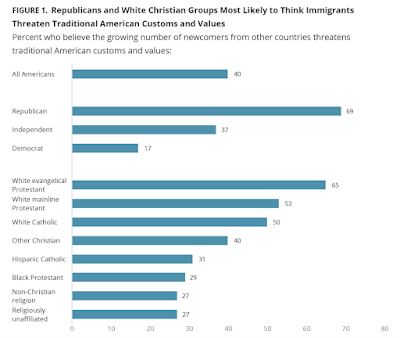
Today, Public Religion Research Group (PRRI) published results of a study it has just done entitled "Are Immigrants a Threat? Most Americans Don’t Think So, but Those Receptive to the 'Threat' Narrative Are Predictably More Anti-immigrant." Some key findings of this report:
A majority (55%) of Americans say that immigrants strengthen American society. But (I'm quoting now from an emailed précis of the report PRRI sent out today:
Most Republicans (69%) and at least half of white Christian groups, including 65% of white evangelical Protestants, 53% of white mainline Protestants, and 50% of white Catholics think immigrants threaten traditional American customs and values. Additionally, three in ten Americans (30%) completely or mostly agree with the statement “immigrants are invading our country and replacing our cultural and ethnic background,” while nearly two-thirds (64%) completely or mostly disagree.
And:
Majorities of Republicans (55%) and white evangelical Protestants (51%) believe that immigrants are invading the United States; a majority of Americans who most trust conservative media outlets (70%) also believe in this replacement theory.
America has a white Christian problem, a white Christian nationalist problem. We learned this in the two elections in which Trump ran for president. In both elections, more than half of US white Christians across the board voted for Donald Trump. The figures of Americans reporting to PRRI that they regard immigrants as a threat are roughly the same percentages of votes cast for Trump in two elections by white Christians — white evangelicals, white mainline Protestants, and white Catholics.
These citizens represent a minorty of Americans, but they have the powerful backing of the Supreme Court and are richly represented in the Republican-dominated Congress.
As PRRI founder and president Robert P. Jones writes in his book White Too Long: The Legacy of White Supremacy in American Christianity (NY: Simon & Schuster, 2020):
The historical record of lived Christianity in America reveals that Christian theology and institutions have been the central cultural tent pole holding up the very idea of white supremacy. And the genetic imprint of this legacy remains present and measurable in contemporary white Christianity, not only among evangelicals in the South but also among mainline Protestants in the Midwest and Catholics in the Northeast (p. 6).
The United States has a white Christian problem. And that problem is imperiling American democracy.

